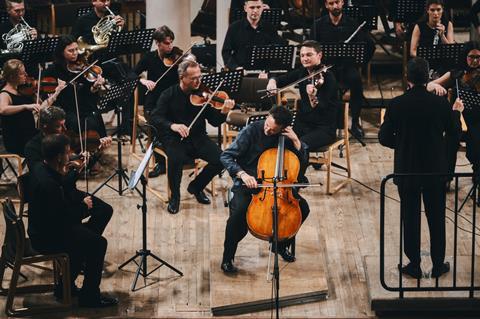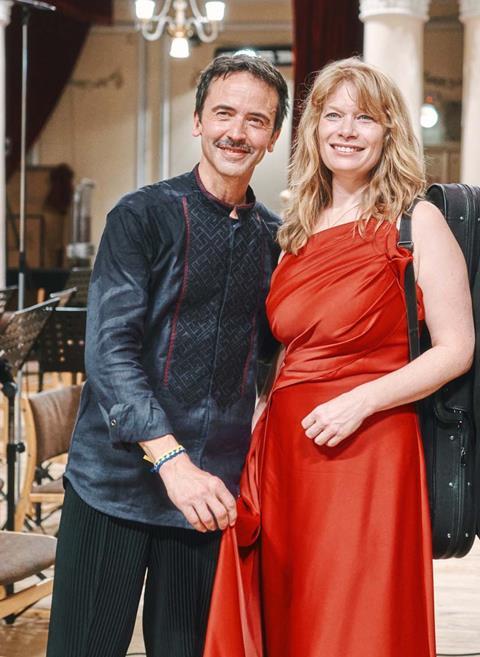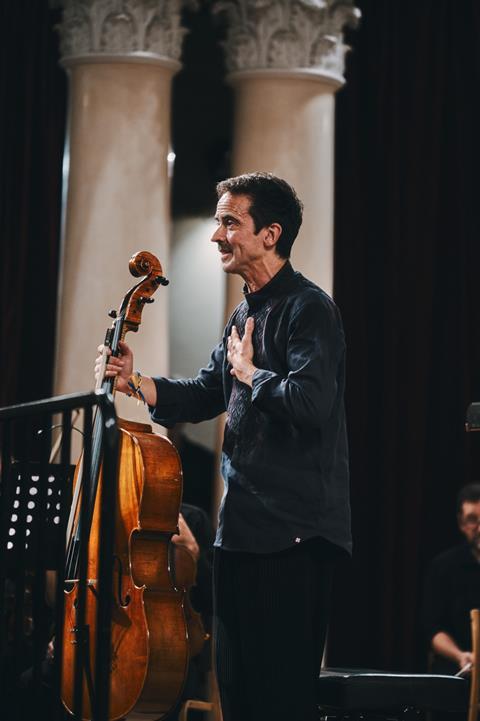The French cellist gives The Strad his thoughts on performing in the Ukrainian capital on 19 August

Discover more Featured Stories like this in The Strad Playing Hub
On 19 August French cellist Jean-Guihen Queyras gave a special performance at the Kyiv Philharmonie in Ukraine’s capital, in an act of hope and solidarity. While there, he also visited a rehabilitation centre for wounded soldiers and a clinic for children suffering from war trauma. Here, he tells The Strad about the concert and gives his impressions of Ukraine in the midst of war.
What were your first impressions of performing in Kyiv?
Until you’re there you don’t know what to expect. Even though Kyiv has been drained of so much of its population, the hall was filled to its last seat, because the people want to say, ‘They won’t take art from us. Art goes on and music goes on’. It’s so compelling to see, especially the drive from the musicians themselves. When the concert halls were closed, they would be playing all over the city, from shopping centres to hotel courtyards – anything to keep the music alive.

Who performed at the Kyiv Philharmonie?
The concert was organised by the Kyiv Camerata and also included members of the National Presidential Orchestra. Dmitry Logvin conducted the concert, and in the first part, Bogdana Pivnenko, general director and artistic director of Kyiv Camerata, played the Violin Concerto no.2 by Ukrainian composer Myroslav Skoryk with fiery intensity. I had the honour of performing Saint-Saëns’s Concerto, a piece that brilliantly captures both the torment and the hope, as well as the joy that music can evoke. I also played Fauré’s Élégie, a piece that, of course, gained another layer of meaning in the Ukrainian context, resonating deeply with the audience. It is thanks to the vision and drive of Bogdana, as well as that of Dmitry and Denis Severin (Swiss-based Ukrainian cellist), that this unique concert in Kyiv was made possible.
What were your impressions of daily life in Kyiv at the moment?
There’s still so much beauty in Kyiv. While the city has suffered damage, it hasn’t faced the level of destruction seen in places like Kharkiv or Dnipro. Life goes on – people still go to work, and when they can, they enjoy moments of normalcy, like dining out at nice restaurants or having a coffee. However, the reality of war is ever-present, with air raid alarms sounding about two to six times a day, reminding everyone of the ongoing war.
Read: ‘Music must be played, life must go on’: an update from Ukrainian violin maker Orest Putsentela
Read: Alleged Stradivari violin seized at Ukrainian border
Watch: Ukrainian Poem for violin and piano by Yevhen Stankovych
Despite these interruptions, those who have chosen to stay during the war are determined to continue with their lives and make the best of it. Yet, there’s an undercurrent of suffering; many families have lost sons, brothers, and loved ones on the battlefield. This is why, in addition to the concert, I felt compelled to play for the soldiers – the heroes who have risked everything for their and our freedom and who have been severely wounded in battle.
I also gave a workshop for children traumatised by the war. While one cannot change their difficult circumstances, I wanted to offer something small but meaningful – the healing sound of the cello. Listening to parts of Bach’s Cello Suites, both the soldiers and the children found moments of reflection, relief and peace. Even if only for a brief time, those encounters were profoundly significant.
How has it changed your perspective?
My core perspective hasn’t shifted – I’ve always had a deep empathy for what’s happening here. However, what has evolved for me is the recognition of how vital the role of music and the exchange between Ukrainian musicians and the global community truly is. While the war understandably draws resources away from the arts, it’s essential that these human and musical connections persist. They offer hope and help lay the groundwork for the future of Ukraine and its people.

Read: Cellist activist arrested for playing Bach in Citibank protest
Read: Jean-Guihen Queyras to perform in Ukraine in an act of hope and solidarity
Read more Featured Stories like this in The Strad Playing Hub
The number one source for playing and teaching books, guides, CDs, calendars and back issues of the magazine.
In The Best of Technique you’ll discover the top playing tips of the world’s leading string players and teachers. It’s packed full of exercises for students, plus examples from the standard repertoire to show you how to integrate the technique into your playing.
The Strad’s Masterclass series brings together the finest string players with some of the greatest string works ever written. Always one of our most popular sections, Masterclass has been an invaluable aid to aspiring soloists, chamber musicians and string teachers since the 1990s.
American collector David L. Fulton amassed one of the 20th century’s finest collections of stringed instruments. This year’s calendar pays tribute to some of these priceless treasures, including Yehudi Menuhin’s celebrated ‘Lord Wilton’ Guarneri, the Carlo Bergonzi once played by Fritz Kreisler, and four instruments by Antonio Stradivari.













































No comments yet